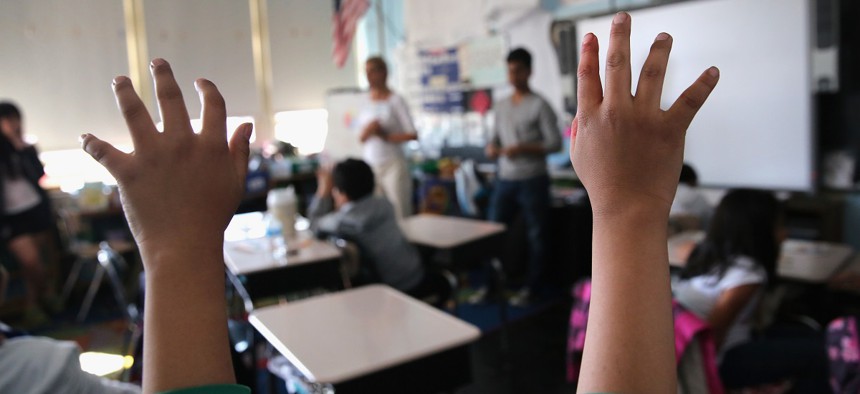Opinion
Opinion: Keep NYC after-school programs affordable, while still paying workers fair wages
Here’s why we must advocate for increased funding.

Children ask questions during an after-school program at P.S. 199 in Queens. (Photo by John Moore/Getty Images)
After-school programming in New York City is in high demand but short on supply. Beyond being a practical solution for working families, these programs deeply enrich young people’s lives, providing them with a space to learn new skills and to explore new interests in areas such as music, theater, language, robotics, athletics, etc. This year we must advocate not only for increased funding but also for better wages for the dedicated after-school providers who make quality, accessible programming possible .
After-school programs are an essential support for working parents, and they are also far more than that; they are a lifeline for families striving for a better future. Bridging the gap between the end of the school day and the time parents finish work, ensures both that children are in a safe, supervised environment and also that families don’t have to choose between work and the well-being of their children. After-school programs offer a structured space where students can spend critical time with peers and engage in meaningful activities, receive academic support, and develop crucial social skills.
Behind the scenes of every successful after-school program are dedicated team staff and providers who work tirelessly to create a nurturing and educational environment for students. These unsung heroes in our communities are making a positive impact on students’ futures, yet they are not receiving a livable wage that reflects the skill, expertise, and heart that they bring to the work or the impact they have on the lives of students, their families, and their communities. Moreover, inadequate wages prevent providers from being able to retain talent and expertise over the long term and make it impossible for after-school professionals from being able to support a family-sustaining career while doing this work.
The majority of after-school providers, predominantly women and people of color, find themselves caught in a cycle of low wages that perpetuates financial instability. These committed professionals, who play a pivotal role in shaping the lives of our children, often struggle to make ends meet, facing the reality of living paycheck to paycheck.
To truly amplify the impact of after-school programming in New York City, we must address the issue of fair wages for after-school providers. The well-being of these essential workers and the success of after-school programs are closely linked. Adequate compensation not only reflects the value society places on the crucial work of these providers but also ensures a stable and motivated workforce, which is good for all of New York.
Fair wages are not only a matter of economic justice but a strategic investment in the quality and sustainability of after-school programming. Higher wages attract the most talented and passionate individuals and enables providers to retain skilled and experienced professionals in the field they love. This, in turn, provides enhanced educational support and sustained mentorship to the students they serve. The positive effects of fair compensation ultimately benefit students, families, and communities the most.
By prioritizing the essential role of after-school programming in the lives of students and working families, we can build a city where opportunities abound, equity prevails, and success is within reach for all. This year’s budget provides us with an opportunity to advocate both for increased funding for after-school programming and fair wages for after-school providers. The Bring Up Minimum Pay Campaign’s call for legislative action to align wages with the true cost of living is essential for after-school providers, as well as all human services professionals.
Michelle Yanche is CEO of Good Shepherd Services and member of the New York Nonprofit Media Advisory Board and Zellnor Myrie is a state senator representing New York’s 20th Senate District.
NEXT STORY: Opinion: Who is making immigrant youth in NYC a priority?
